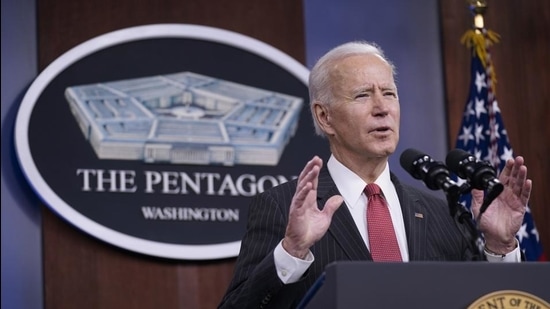US President Joe Biden forms military task force to tackle China
Later, Biden spoke about his “priorities of protecting the American people’s security... and preserving a free and open Indo-Pacific” in his first phone call with Chinese President Xi Jinping
US President Joe Biden on Wednesday announced the formation of a department of defence task force to recommend key priorities and decisions to “chart a strong path forward on China-related matters”.

Biden made the announcement during his first visit to the Pentagon,the headquarters of the US department of defence, along with vice-president Kamala Harris.
Later in the day, Biden affirmed his “priorities of protecting the American people’s security, prosperity, health, and way of life, and preserving a free and open Indo-Pacific” in his first phone call with Chinese President Xi Jinping.
“President Biden underscored his fundamental concerns about Beijing’s coercive and unfair economic practices, crackdown in Hong Kong, human rights abuses in Xinjiang, and increasingly assertive actions in the region, including towards Taiwan,” the White House said in a statement.
Biden and Xi also exchanged views on the Covid-19 pandemic, climate crisis, and preventing weapons proliferation.
Announcing the task force, Biden said it will “look at our strategy and operational concepts, technology, and force posture, and so much more” and it will work across the department to provide recommendations to secretary of defence Lloyd Austin “on key priorities and decision points so that we can chart a strong path forward on China-related matters”.
Ely Ratner, a special assistant to the US secretary of defence, will head the 15-member body drawn from across the department. It will have four months to submit it recommendations.
Ratner is an Asia expert and has been with Biden for a long time, working in various capacities. He served on Biden’s staff in the Senate and then on the Senate foreign relations committee. He was in the state department before joining Biden, who was vice-president at that time, as his deputy national security adviser.
Ratner and Kurt Campbell, the Indo-Pacific coordinator in the National Security Council, have emerged as the Biden administration’s key hands-on officials for the region.
The Biden administration has been under mounting pressure at home and abroad to come up with an explicit policy on China, going beyond remarks by the president and his top national security and foreign policy officials.
During a visit to the state department last week, Biden called China “America’s most serious competitor” and, he had added, “we’ll confront China’s economic abuses, counter its aggressive, coercive action to push back on China’s attack on human rights, intellectual property, and global governance”.
The US president also spoke of “growing challenges posed by China to keep the peace and defend our interests in the Indo-Pacific and globally”.
Though housed in the Pentagon, the task force will require, the president said, a “whole-of-government effort, bipartisan cooperation in Congress, and strong alliances and partnerships”.
The United States has said it believes China is seeking to “overturn” the rule-based structure that has worked for all nations in the Indo-Pacific region and is “using all elements of national power to bend the nations (in the region) to its will”. And countering China in this context will be the focus of the task force.
Defence department officials described the task force as a “sprint effort” that will examine and marshal all aspects of American power — strategy, operational concepts, technology and force structure, force posture and force management and intelligence — as a well as “alliances and partnerships and their impact on Sino-American relations and the defence department’s relations with China”.
The phrase “sprint effort” appears to be a spin-off of “pacing threat”, a terminology previously used by top Pentagon officials such as secretary Austin and deputy secretary of defence Kathleen Hicks, according to defence department officials, to describe the relationship with China as a strategic competitor.





